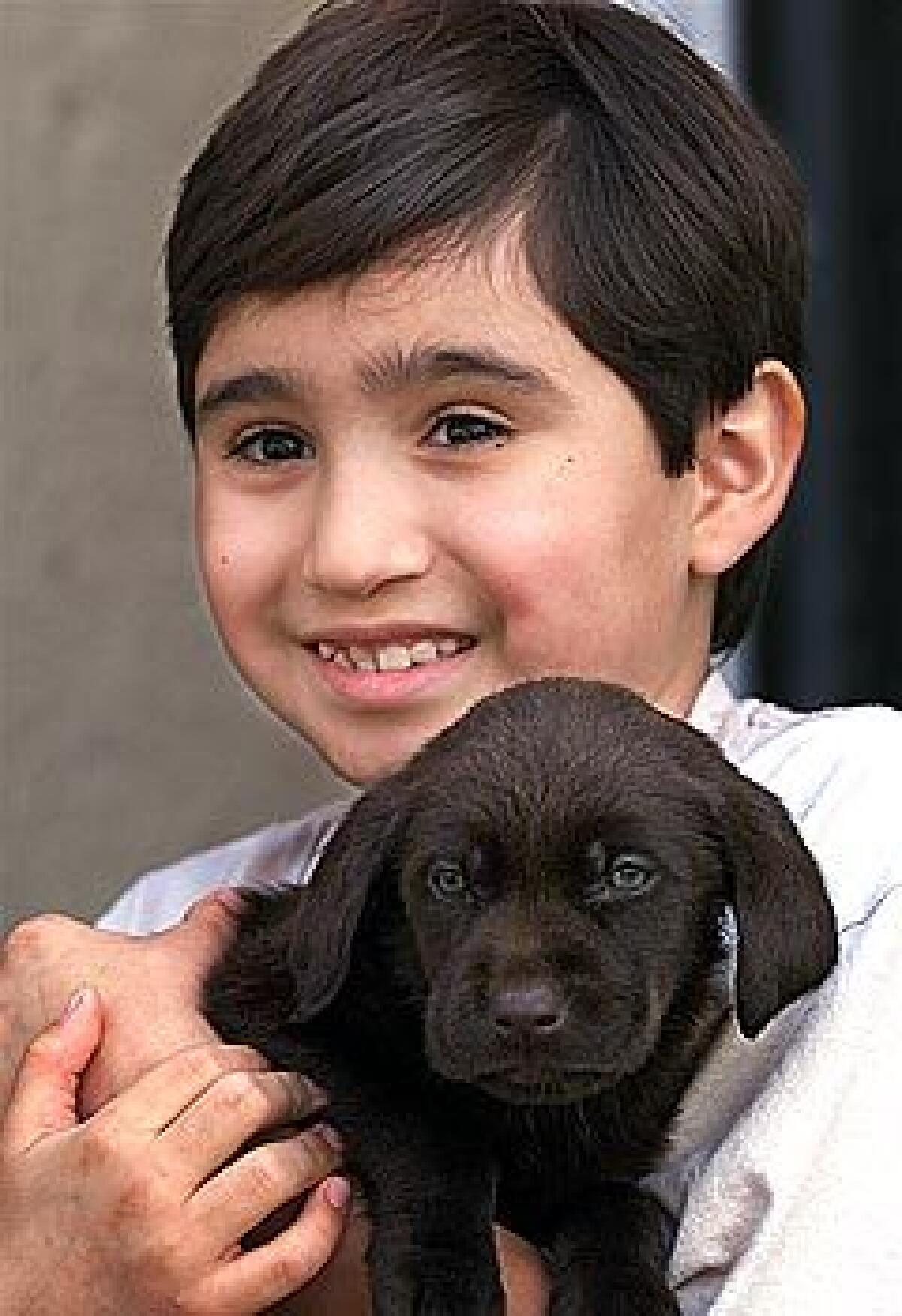This Year, Frankie Finally Got His Puppy

- Share via
For all the difficulty autism poses for my 8-year-old son, Frankie, this holiday season has helped me realize how much progress he’s made fighting the mysterious neurological disorder that afflicts him.
Not everything went smoothly for Frankie in 2000. Indeed, when the year began my wife, Magdalena, and I were as worried about his future as we’d ever been--perhaps even more frustrated than we were when his autism was diagnosed five years ago.
Autism is a disorder that affects the ability of the brain to process stimuli like touch, light and sound. In severe cases, its victims are institutionalized, but even in its mildest forms it can seriously interfere with the ability of children to learn and interact socially. It is the third-most common children’s disability, after mental retardation and cerebral palsy.
Because of all the time and effort Magdalena and I have put into learning about autism and its possible treatments since Frankie was diagnosed, we have been able to help him overcome its more obvious symptoms. We worked with our doctors to identify medications to control the allergies that can set off autistic behaviors. And after intensive therapy at UCLA’s respected Lovaas Institute for Early Intervention, we were able to enroll Frankie in public school.
Unfortunately, this year we were forced to conclude that our noble experiment at a mainstream education for Frankie was--at least temporarily--a failure. He handled kindergarten and the first grade with the help of a Lovaas aide in the classroom. But he began to fare badly after that support was withdrawn, and his second-grade studies were accelerated, at the behest of our school district.
By last spring, Frankie was so frustrated with trying to learn to read that he was refusing to try. He had fallen behind his classmates in other learning skills and his public behavior had regressed badly, so that he was often withdrawing into his own private world rather than interacting with peers.
In near-desperation, we began to pull Frankie out of school early, creating an educational program tailored to him that included Lovaas therapists and the innovative Lindamood-Bell reading program, which has proved successful in helping children with dyslexia learn to read. Frankie responded so well to the Lindamood-Bell method that, during the summer, Magdalena and I made what at first seemed like a risky decision: to home-school Frankie in the fall.
It proved to be one of the best things we’ve done for him. That is largely because of the patience and natural teaching ability of Frankie’s favorite aunt. My sister, Elisa Garcia--”Aunt Lisa,” as Frankie calls her--ran Head Start programs in the Antelope Valley before I shanghaied her into helping us with our son’s home-schooling.
As radical as it may sound, home-schooling is easy to do, especially in the primary grades--at least for those families with adults who are able and willing to guide children through the required state curriculum. There are many reputable and long-established home-schooling associations that provide guidance about the legal requirements and the necessary books and materials at a reasonable cost.
But I must be honest. Even for two professional parents, home-schooling a child with autism would not have been nearly so successful without someone like Frankie’s Aunt Lisa to help out. She has always had a special rapport with Frankie.
He is reading now, not just on his own but with genuine enthusiasm. Frankie keeps a daily journal and is full of questions that he asks in an increasingly sophisticated vocabulary.
Just how sophisticated became clear when Frankie wrote a letter to Santa Claus asking--just as he had last year--for a puppy. He didn’t get a dog back then because we were still trying to bring Frankie’s allergies under control, and his doctor warned us that a new pet could complicate the process.
Frankie’s health is better now, and his Christmas wish was more specific. The dog, he wrote Santa, was to be a brown Labrador retriever. And each word--except retriever, which even gives me a little trouble--was spelled correctly.
I knew Aunt Lisa was in the habit of taking Frankie to the public library once a week to pick out new books to read. And that several of those books have lately been about dogs. But Frankie was so knowledgeable and precise as to what kind of pet he wanted that I knew there would be no avoiding the issue this year. So I began perusing the Internet, calling dog breeders and reviewing the many suggestions sent to me by kind readers last Christmas after I wrote about Frankie’s unfulfilled wish for a puppy.
This year Frankie got his dog--a few days before Christmas so a vet could make sure the puppy was healthy. And my son knows his mind well enough that he even rejected my simplistic suggestion for a name: Cocoa.
“His name will be Chocolate,” Frankie wrote to Santa, spelling that big word right.
Frank del Olmo is associate editor of The Times.






